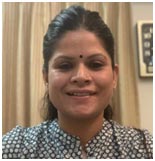Every morning one learns the COVID cases are rising quite in proportion with the population of the country. One wonders where the Government is going wrong in controlling the situation. However, the fact remains that it cannot do much until we do our little bit. When you drive across the city and see well educated citizens standing without masks, without any social distancing, hundreds of children playing in the public fields and the majority not following the discipline we have been asked to follow, you get the answer to why the spread in the virus and why it is an uncontrolled state of affairs. This was the basis for Seven Oaks School to organise a Webinar for students, parents and teachers. The intention was to bring the medical professionals and the common man on a platform.
 Dr Mohit Tayal is an interventional radiologist at AIIMS, Rishikesh. He is credited with inventing the world’s first ever remote health monitoring system in collaboration with the Government of India, PSUs BEL and ECIL, for monitoring health parameters of home quarantined COVID cases. In fact, Dr Tayal is the first radiologist to have joined AIIMS, Rishikesh. Dr Anirudh Mukherjee is a geriatrician working at AIIMS, Rishikesh. He has previously worked with King George Medical University, Lucknow. He is an integral part of the COVID team and has been working with Corona cases at AIIMS, Rishikesh, with a recovery rate of more than 80%.
Prinicpal Lalit Mohan Kumar welcomed the doctors and introduced them to the audience. Chairman Dr S Ganguli referred to the current scenario. Dr Tayal and Dr Mukherjee first explained what COVID is, the lifestyle changes required, what steps are needed safeguard ourselves, how senior citizens and young children should build up their immunity. They also assured the public that under the guidance of the Director, AIIMS, and the state authorities, AIIMS Rishikesh is very well prepared with facilities and required logistics to cater to the city and state.
Dr Mohit Tayal is an interventional radiologist at AIIMS, Rishikesh. He is credited with inventing the world’s first ever remote health monitoring system in collaboration with the Government of India, PSUs BEL and ECIL, for monitoring health parameters of home quarantined COVID cases. In fact, Dr Tayal is the first radiologist to have joined AIIMS, Rishikesh. Dr Anirudh Mukherjee is a geriatrician working at AIIMS, Rishikesh. He has previously worked with King George Medical University, Lucknow. He is an integral part of the COVID team and has been working with Corona cases at AIIMS, Rishikesh, with a recovery rate of more than 80%.
Prinicpal Lalit Mohan Kumar welcomed the doctors and introduced them to the audience. Chairman Dr S Ganguli referred to the current scenario. Dr Tayal and Dr Mukherjee first explained what COVID is, the lifestyle changes required, what steps are needed safeguard ourselves, how senior citizens and young children should build up their immunity. They also assured the public that under the guidance of the Director, AIIMS, and the state authorities, AIIMS Rishikesh is very well prepared with facilities and required logistics to cater to the city and state.
The students posed numerous questions. There were questions varying from details about masks, COVID tests, quarantine procedures, how they could help their elders at home, etc.
This webinar reached 1300 families and approximately 70,000 people.
 – By Shreya Ganguli Mukherjee
– By Shreya Ganguli Mukherjee


